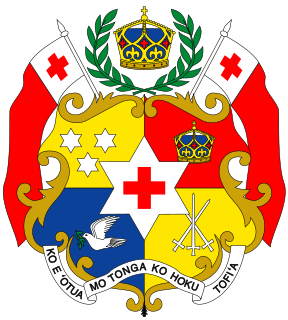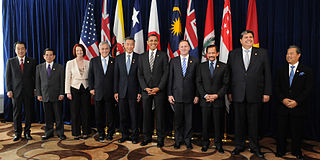
The politics of the Federated States of Micronesia (FSM) takes place in a framework of a federal representative democratic republic. The President of the Federated States of Micronesia is both head of state and head of government. Executive power is exercised by the president and his cabinet, while legislative power is vested in both the president and the Congress. The judiciary is independent of the executive and the legislature.

Kiribati is a full member of The Commonwealth, the IMF and the World Bank, and became a full member of the United Nations in 1999. Kiribati hosted the Thirty-First Pacific Islands Forum in October 2000. Kiribati has Least Developed Country Status and its interests rarely extend beyond the region. Through accession to the Cotonou Agreement, Kiribati is also a member of the African Caribbean and Pacific Group. Kiribati maintains good relations with most countries and has particularly close ties to Pacific neighbours Japan, Australia, and New Zealand. Kiribati briefly suspended its relations with France in 1995 over that country's decision to renew nuclear testing in the South Pacific.

Vanuatu maintains relations with more than 65 countries, and has a small network of diplomatic missions. Australia, France, Republic of Korea, New Zealand, the People's Republic of China and the United Kingdom maintain embassies, high commissions, or missions in Port Vila. The British High Commission maintained a continued presence for almost a century, though closed from 2005 until reopening in 2019.

The United Nations Economic Commission for Europe (ECE) is one of the five regional commissions under the jurisdiction of the United Nations Economic and Social Council. It was established in order to promote economic cooperation and integrations among its Member States.

Foreign relations of Australia are influenced by its position as a leading trading nation and as a significant donor of humanitarian aid. Australia's foreign policy is guided by a commitment to multilateralism and regionalism, as well as to strong bilateral relations with its allies. Key concerns include free trade, terrorism, refugees, economic co-operation with Asia and stability in the Asia-Pacific. Australia is active in the United Nations and the Commonwealth of Nations. Given its history of starting and supporting important regional and global initiatives, it has been described as a regional middle power par excellence.

The Association of Southeast Asian Nations is a regional intergovernmental organization comprising ten countries in Southeast Asia, which promotes intergovernmental cooperation and facilitates economic, political, security, military, educational, and sociocultural integration among its members and other countries in Asia.

The Pacific Community (SPC) is an international development organisation owned and governed by its 26 country and territory members. The organisation's headquarters are in Nouméa, New Caledonia, and it has regional offices in Suva, Fiji, and Pohnpei, Federated States of Micronesia, and Port Vila, Vanuatu, and field staff in other Pacific locations. Its working languages are English and French.

Nauru, following independence from the United Kingdom, became a sovereign, independent republic on 31 January 1968. Nauru has established diplomatic relations with a number of nations, including most of its Pacific neighbors with which it maintains economic, cultural and administrative ties with its regionally.

This article is about the foreign relations of Tuvalu.

Tonga, by a modification of its treaty of friendship with the United Kingdom in July 1970, is responsible for its own external affairs. It maintains cordial relations with most countries and has close relations with its Pacific neighbours and the United Kingdom. In 1998, it recognized the People's Republic of China and broke relations with Taiwan.

Northeast Asia, North-East Asia or Northeastern Asia, is a geographical subregion of Asia; its northeastern landmass and islands, by the Pacific Ocean.

In international relations since the late 20th century, a regional power is a term used for a state that has power within a geographic region. States which wield unrivalled power and influence within a region of the world possess regional hegemony.

The United Nations Economic and Social Commission for Asia and the Pacific (ESCAP) is one of the five regional commissions under the jurisdiction of the United Nations Economic and Social Council. It was established in order to increase economic activity in Asia and the Far East, as well as to foster economic relations between the region and other areas of the world.

The Trans-Pacific Partnership (TPP), also called the Trans-Pacific Partnership Agreement, was a proposed trade agreement between Australia, Brunei, Canada, Chile, Japan, Malaysia, Mexico, New Zealand, Peru, Singapore, Vietnam, and the United States signed on 4 February 2016, which was not ratified as required and did not come into effect. After the newly elected US president Donald Trump withdrew the US signature from TPP in January 2017, the agreement could not enter into force. The remaining countries negotiated a new trade agreement called Comprehensive and Progressive Agreement for Trans-Pacific Partnership, which incorporates most of the provisions of the TPP and which entered into force on 30 December 2018.

The Philippines' Department of Foreign Affairs is the executive department of the Philippine government tasked to contribute to the enhancement of national security and the protection of the territorial integrity and national sovereignty, to participate in the national endeavor of sustaining development and enhancing the Philippines' competitive edge, to protect the rights and promote the welfare of Filipinos overseas and to mobilize them as partners in national development, to project a positive image of the Philippines, and to increase international understanding of Philippine culture for mutually-beneficial relations with other countries.

Eradication is the reduction of an infectious disease's prevalence in the global host population to zero. It is sometimes confused with elimination, which describes either the reduction of an infectious disease's prevalence in a regional population to zero, or the reduction of the global prevalence to a negligible amount. Further confusion arises from the use of the term eradication to refer to the total removal of a given pathogen from an individual, particularly in the context of HIV and certain other viruses where such cures are sought.
Dr. Dwaram Bap Reddy was a top-ranking official within the United Nations System. He served at the Food and Agriculture Organization of the United Nations for twenty years.

The Eurasian Economic Union (EAEU) is an economic union of states located in Eastern Europe, Central Asia and Western Asia. The Treaty on the Eurasian Economic Union was signed on 29 May 2014 by the leaders of Belarus, Kazakhstan and Russia, and came into force on 1 January 2015. Treaties aiming for Armenia's and Kyrgyzstan's accession to the Eurasian Economic Union were signed on 9 October and 23 December 2014, respectively. Armenia's accession treaty came into force on 2 January 2015. Kyrgyzstan's accession treaty came into effect on 6 August 2015. It participated in the EAEU from the day of its establishment as an acceding state.
The Regional Comprehensive Economic Partnership (RCEP) is a proposed free trade agreement in the Indo-Pacific region between the ten member states of the Association of Southeast Asian Nations (ASEAN), namely Brunei, Cambodia, Indonesia, Laos, Malaysia, Myanmar, the Philippines, Singapore, Thailand, and Vietnam, and five of ASEAN's FTA partners—Australia, China, Japan, New Zealand, and South Korea. India, which is also ASEAN's FTA partner, opted out of RCEP in November 2019.
















